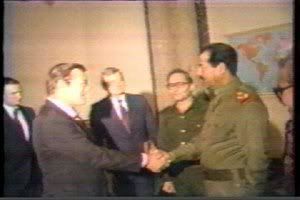My all too brief argument with Jonah Goldberg
Earlier this month, I enlisted in the United States Army. I have a college degree, and my scores on the ASVAB lead the test proctor to say "don't f--- with enlisting". However, the officer corps in both the Marines and the Army provide open-contracts. With enlistment, I can select a particular job and have that on my contract, as both the MOS and my Advanced Individual Training (AIT). Please forgive me for not going into the nitty gritty about what I will be doing. I will provide these hints: it is not infantry and it is not public affairs.
I am thrilled with the job I have, and my motivation is only rising.
Anyone that has occasioned this website would know my opinions of our current foreign policy. We are not conducting ourselves as well as we should. Iraq has been a disaster. If we do not make important changes in Afghanistan, there will be hell to pay there -- again. The war between Ethiopia and Somalia has just begun. The war between Hezbollah and Israel was a mistake for both sides.
Our president had a noble idea concerning the Middle East, but based on a lot of his talk (such as his post Katrina promises) I question his motives. At the least, the implementation of his plan was terrible. The Arab street has got to see more prosperity in social, economic and political life or else there will be many angry young adults.
In Iraq, we have only made them angrier.
Our domestic counterterrorism efforts have not been stellar. We have profited from the major disruptions to al Qaeda from 2001 - 2002, conducted by CIA and special forces and augmented with conventional formations. As a result of this good work, we've faced al Qaeda's B Team for a number of years. It is likely that this will change unless we refocus our efforts.
These observations make me more inclined for service to our country.
For the past few weeks, I have wondered how to "announce" my career change on this blog. I saw via TailRank this post by Jonah Goldberg. I do not read him often, but he seems to jump at every opportunity to slightly (oh, so slightly) redeem the president's efforts. In this post, it's a contrast between DeFrank's account of Gerald Ford and Woodward's. Woodward cast Ford as anti-Iraq war. DeFrank made some of the same observations, then added that Ford voiced his support for the war. Then he highlighted Ford's concerns over personal privacy. Historians, no doubt, will pour over the notes, as this will be an important passage in the accounting of our time. DeFrank and Woodward provide two glimpses. Goldberg focuses on the most extreme positives available in these pictures, these imperfect pictures.
If I may be so bold, I think Gerald Ford wrestled with the Iraq war like any good American would do at this point.
So, I sort of lost my cool and sent the 37-year-old Goldberg an email:
According to your Wikipedia (http://en.wikipedia.org/wiki/Jonah_Goldberg) you are 37. That is way too old for the Corps, but the Army will take you.Here is Jonah's response:
http://www.goarmy.com/flindex.jsp
http://marines.com/page/usmc.jsp?flashRedirect=true
Frankly, I'm sick of you. Get some guts and fight this war if you like it so much.
Most disrespectfully,
Future Soldier (Last name redacted)
JonahNRO@aol.com to meHe posed two questions, which I answered. However, he had already blocked me with his AOL account... So he must not have actually wanted these answered. I suppose that leaves them as mere rhetorical questions from JonahNRO@aol.com. Therefore, it leads me to believe that he thinks I am a nobody (which is true) and and that my opinion, even as a soon-to-be soldier, is not important. Here was my response, just for the record:
yawn. get some new material. By the way, why should I give a rat's ass that you're sick of me? Who are you?
As my signature indicated, I am going into the United States Army.TCR does do great work watching the so-called "right" from an actual right-winger's perspective.
So, I'm going to be John Q. Soldier. Even though I think this war is garbage, the situation is out of hand and likely to get far more dangerous for our country. I would appreciate a little more intellectual honesty from your NRO friends. I would suggest the commentaries of this Blogger concerning what NRO produces:
http://cunningrealist.blogspot.com/
He is far more eloquent than I.
There is no reason you should give a rat's ass that I am sick of you. I just wanted to tell you that I was. As you replied my comment, I now know that you know that I am sick of you. And this brings me great joy.
My best wishes to everyone, and have a Happy New Year! I'm going to stop blogging until next week. Oh, and if you like what you have read on this site, click some Google ads. An E4's salary is sort of minimal at best.


